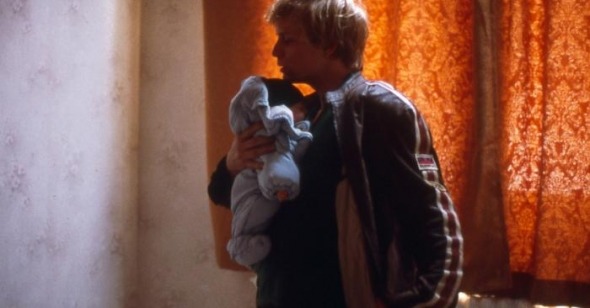As per usual, this Reverse Shot Top Ten list was compiled by polling each of our loyal staff writers for their ten favorite films of the year. The first-place ranked film received ten points, the second-place nine points, and so on. Each film on the resulting list is then assigned to a writer who has a special place in his or her heart for that particular title. We wish we had space to honor our beloved runners up (A Prairie Home Companion, Inside Man) or other individual favorites (Fast Food Nation, Iraq in Fragments). No grand statements or overviews about 2006, or the arbitrary commingling of different national cinemas and filmmakers—for now, here's yet another top ten list.
Capsules written by Reverse Shot staff writers James Crawford, Eric Hynes, Michael Koresky, Danielle McCarthy, Kristi Mitsuda, Nick Pinkerton, Jeff Reichert, Michael Joshua Rowin, Elbert Ventura, and Chris Wisniewski.
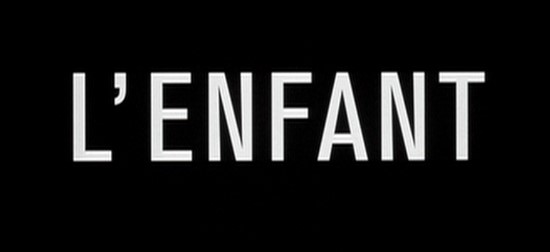
1. L'enfant
What words will come when trying to describe a film that left me reeling with four successive jagged, teary outbursts? I could recall Jean-Pierre and Luc Dardennes' earlier narrative films, of which L'enfant is the fourth masterpiece in a row, and insist that their stories of moral dilemmas and spiritual regeneration are getting even better with age. Or I could focus on the directors' daring plunge into the economic hardships and horrors that keep our Western world moving ahead like a runaway train while keeping the less privileged both undernourished and overstimulated by want. Or I could defend the film's inciting event (a young father's selling of his baby on the black market, behind its mother's back), often criticized as unbelievable by naysayers, as the perfect evocation of the unthinkable depths people find themselves descending to in times of need. Or maybe it would be necessary to recall the great neorealist works of Rossellini and De Sica as a proper reference point for such spare clarity. Instead, I'll just transport myself back to that overwhelming rush of emotion I felt when I first saw L'enfant and revel in its untranslatable catharsis. —MK
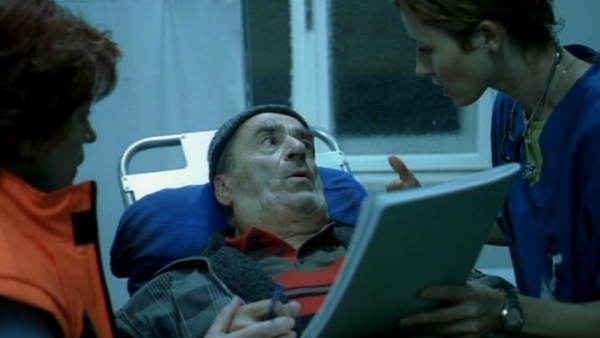
2. The Death of Mr. Lazarescu
Here's how it goes, year after year: everyone buzzes around some hot-topic steamer; the thing that matters quietly disappears. Hopefully (knock on wood), posterity sorts things out. Because you've gotta sum up the year somehow, everybody's decided that 2006 was a terrible year for movies. But we got a few really special films out of it, and it's imbecilic to ask any more of a medium than that. The most special was The Death of Mr. Lazarescu, a Romanian film maladroitly marketed stateside as a madcap bureaucratic comedy of errors (in fairness, it wouldn't have made any more of an impact with an accurate trailer). Lazarescu shows a dogged fidelity to its subject—nearly three hours in the life of a direly ill man being tossed between Bucharest hospitals —and an unostentatious mastery in execution. I only hope more people get to see it on DVD, because it's profoundly human filmmaking, the kind of thing that helps me not regret ruining my eyes in movie theaters. —NP
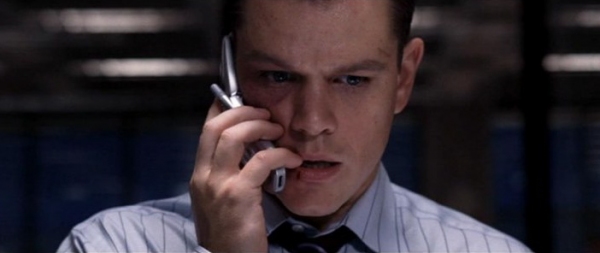
3. The Departed
As one of the quiet minority who generally approaches the release of a new Martin Scorsese picture with wariness rather than anticipation, it's a great pleasure to join the majority in singing the praises of The Departed. "Great pleasure" is a bit of an understatement—there may not have been more honest enjoyment to be had watching a movie in all of 2006, and, no, there's actually nothing wrong with that. Perhaps Scorsese's latest is nothing more than a tightly wound, flawlessly executed genre picture (and so what if it is? Fuck your mother), but The Departed stands as a perfectly constructed counterpoint and follow-up to the loopy excesses of The Aviator and still managed to find space for baroque touches: Jack Nicholson stamping a fly on a table and slurping it off of his hand, Alec Baldwin exhorting the wonders of the Patriot Act or plunging face-first into a bucket of ice, constant swearing elevated into near poetry. This stuff—let's call it, say, entertainment—was in far too short supply over the past twelve months, and Scorsese reveled in the sheer movie-ness of his setup, delivering in grand fashion across 150 sprawling minutes and directing a handful of the year's best performances. The few naysayers cry: "Oh yeah? What's The Departed about, huh?" Masculinity, performance, identity, narrative play...um...does it really matter when a movie is this impossibly enjoyable? –JR
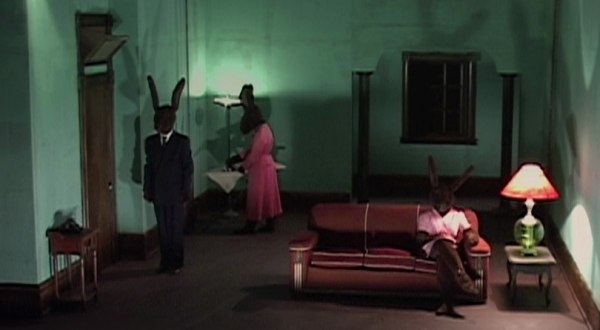
4. Inland Empire
It may seem like some tossed-off bromide, but nothing—no amount of verbiage, certainly no film experience—is adequate preparation for Inland Empire, David Lynch's sprawling, dense, largely inscrutable epic shot for a nickel and cup of coffee on prosumer digital video. Lynch at times recapitulates Mulholland Drive's permeable fiction-actuality flux as though Stan Brakhage were his cinematographer, scratching (metaphorically, at least), muddying, and distorting the frame, going balls-deep into the visual potentials of his new media with ferocious zeal, like a transplant patient given something new for which to live. And at others he goes entirely non-narrative with a willful, abstract opacity that puts even Eraserhead in the shade. Laura Dern is stretched to her brittle breaking point, terrorized, beaten, stabbed, and generally fucked with, a torrent of physical and emotional depredations she weathers with beautifully expressive saucer eyes and a saint's forbearance. But those who would cry Sadism can put their barbs away, because Dern attains transcendence in the end, leaping through a fissure in Lynch's mise-en-abyme rabbit holes to escape the vortex of curses, abuse, and horror (not felt so viscerally onscreen in quite some time) and establish the grace of her sublime visage; she's a halo of light floating weirdly through the pulsing blackness of the DV-void. Inland Empire represents the apotheosis of a director's idiosyncratic self-indulgence-both the best and worst of it—but if you're at all taken by Lynch's razor-wire narrative instabilities and I-have-no-earthly-idea-where-this-is-going trajectories, it's impossible not to be enthralled. —JC
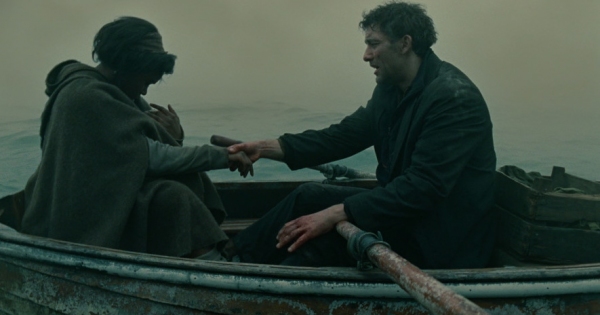
5. Children of Men
It’s somehow telling that two of the best films of the year are defined by death and the long take. Both The Death of Mr. Lazarescu and Children of Men capture man’s dilemma eloquently, pinning him to his environment without the respite of a cut. Tracking death—of one man in the former, of the human race in the latter—both movies express with unique power the inescapability of the physical world. This anxiety about the world we live in is further illuminated by a pairing with a natural partner: V for Vendetta. An incendiary piece of agit-pop, that film stages its call for revolution in a recognizable dystopia, much like Children of Men does. Ghosts from our pixilated nightmare populate both: detainees in black hoods, snarling dogs in prison camps, martyrs calling for revolution. V for Vendetta’s irresponsible politics finally complicate its critique. Children of Men, on the other hand, charts a path to the future that looks depressingly familiar. Cuarón makes us see how we can get there from here. —EV
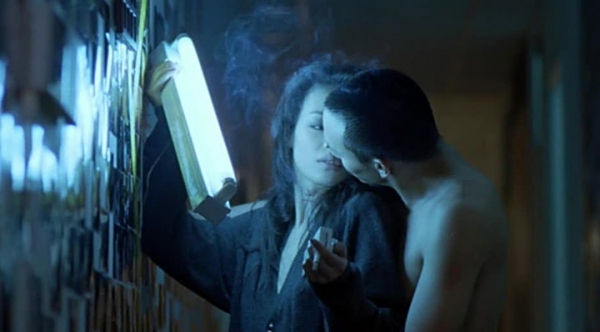
6. Three Times
Though Hou Hsiao-hsien's Three Times earned almost unanimous praise for its rapturous loveliness, it also drew a fair amount of criticism for recapitulating themes and revisiting milieux from Hou's previous films. Indeed, if we wanted to look at Three Times just as a collection of three short films, they would all fall short of their antecedents: "A Time for Love" recalls, without really expanding upon, some of Hou's earliest work; "A Time for Freedom" pales in comparison to his masterpiece, Flowers from Shanghai; and "A Time for Youth" lacks the richness and complexity of his underappreciated Millennium Mambo. Whatever intellectual quibbles its tripartite structure enables, though, the exhilaration of Three Times lies in the spaces in between, in the way its three vignettes form a single, unified whole, bringing history, memory, and the texture of personal experience into vivid relief. It is no small praise to say that this wonderfully acted, hauntingly gorgeous film proves to be quite more than the sum of its parts: a ravishing emotional experience, a quietly devastating temporal journey, and an accumulation of unforgettable moments—two lovers' hands touching in the rain, a young girl, still a child, training to be a courtesan, a woman desperately clinging to another person on a motorcycle as the din of the city engulfs her. Hou's films have always been formally rigorous, intellectually demanding, and (of course) exquisitely beautiful, but rarely have they been quite so intoxicating—or so heartbreaking. —CW
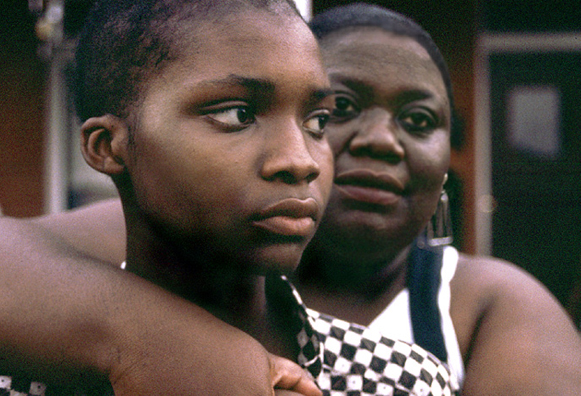
7. A Lion in the House
A four-hour documentary about kids with cancer would be a tough sell in any year. But it would truly be a shame to miss this landmark, certainly one of the best films I've seen in ages. Directors Julia Reichert and Steven Bognar spent six years following five families and their children as they struggle with medical setbacks, navigate through impossible decisions, and yet continue to find the strength to live life rather than mourn its fleetingness. And while it's extremely difficult to bear witness to the passing of some of these wonderful kids, A Lion in the House, in its graceful and empathetic storytelling, never allows for maudlin tears. The filmmakers' commitment to their subjects creates one of the most complex, and unblinking, portraits of life and death that has ever been put onscreen, but in the end, the film's true power lies in the openness of the five children whose lives are already so unfathomably complicated—for weeks after seeing the film I was haunted by dreams about them. Thanks to these brave souls, and their amazing parents, A Lion in the House is not a film about death, but about cherishing life. —DM

8. Old Joy
Suggestive and yet spacious enough to allow—encourage, even—the viewer to mentally wander amidst its verdant surroundings (aided by the lush tunes of Yo La Tengo), Kelly Reichardt's Old Joy bears a deceptive simplicity belied by a wafting, lasting potency. With her focus on the fading friendship between hippie hanger-on Kurt and mainstream-leaning Mark, the director brings into focus two unique portraits of confused masculinity, both free from caricature. Illuminating the shifting negotiations with guilt and insecurity that come with the claiming of responsibility and capitulation to convention, Old Joy probes the complexities of moving into adulthood in an unapologetically specific vein. Though much has been made of its liberalism, this aspect, like the rest of the film, remains sublimely understated; rather, Reichardt rightly assumes political consciousness to be indivisible from everyday existence. In a discouraging year for art houses, that such a subtly profound movie found an audience is cause for hope. —KM

9. Clean
Redemptive drama writ passionate and unmanipulative, Clean is leading light of contemporary French cinema Olivier Assayas's fullest realization of straightforward (but not simplistic) humanism. Always an actor's director, Assayas strips away the experimentation so crucial to his two greatest successes, Irma Vep and demonlover, and in Clean arrives at an economical storytelling and practical aesthetic that allows leads Maggie Cheung, as a dead rock star's recovering junkie widow struggling to earn back her son, and Nick Nolte, as her sympathetic father-in-law, a thousand opportunities to make the film their own. They do, helping their director avoid the potential cliches of such a scenario and, more than that, making it absolutely smolder with delicate evocations of hurt and triumph, interpersonal connections generated from humbling circumstances understood in universal terms. A lush realism of sound and images not so much decorating as revealing emotional truth, Clean is a minor miracle that might once have been considered an impossibility: a hipster's tale of growth and resurgence. —MJR

10. Miami Vice
How's this for totally subverting genre expectations: an action movie in which obligatory sex wraps itself in true sensuousness and emotion, and where the required violence is sketched nearly as an afterthought—and a brutish, crude, and ugly one at that? It's a bummer that this kind of turnabout even needs mentioning, but the aesthetics of violence in film often go so shamefully unquestioned that in Michael Mann's hands a little probing ends up as practically revelatory. But seriousness of revisionist purpose isn't the main course here, even if it provides a ready answer for why Miami Vice is so valuable. A few months on, I'd be hard-pressed to tell you exactly what the thing was about, but here is a case (like the average David Lynch film) where the expunging of narrative in favor of seductively composed images pays dividends. What's memorable is not the tracking of a drug lord by elite cops (I think?) but Miami skylines shot through with an unearthly purple glow framing be-suited Jamie Foxx and Colin Farrell on a rooftop as they mumble jargon into cell phones—as deliberately anti-action as Beckett. That, and speedboats to Cuba, mo-hee-taws, salsa dancing-Miami Vice is nearly avant garde in its interest in images and instants and busts the genre mold because those moments of true concern have so little to do with explosions and dismemberment. —JR
